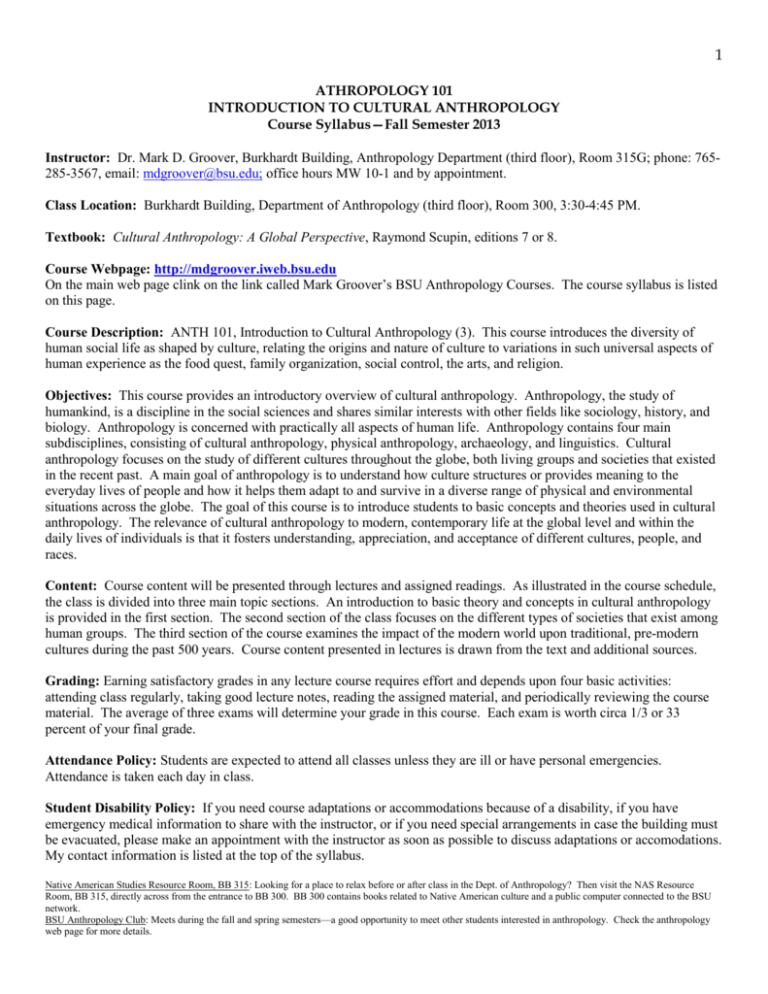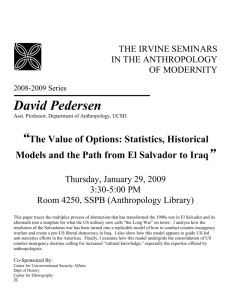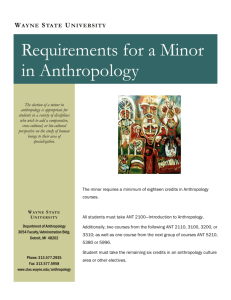1 ATHROPOLOGY 101 INTRODUCTION TO CULTURAL
advertisement

1 ATHROPOLOGY 101 INTRODUCTION TO CULTURAL ANTHROPOLOGY Course Syllabus—Fall Semester 2013 Instructor: Dr. Mark D. Groover, Burkhardt Building, Anthropology Department (third floor), Room 315G; phone: 765285-3567, email: mdgroover@bsu.edu; office hours MW 10-1 and by appointment. Class Location: Burkhardt Building, Department of Anthropology (third floor), Room 300, 3:30-4:45 PM. Textbook: Cultural Anthropology: A Global Perspective, Raymond Scupin, editions 7 or 8. Course Webpage: http://mdgroover.iweb.bsu.edu On the main web page clink on the link called Mark Groover’s BSU Anthropology Courses. The course syllabus is listed on this page. Course Description: ANTH 101, Introduction to Cultural Anthropology (3). This course introduces the diversity of human social life as shaped by culture, relating the origins and nature of culture to variations in such universal aspects of human experience as the food quest, family organization, social control, the arts, and religion. Objectives: This course provides an introductory overview of cultural anthropology. Anthropology, the study of humankind, is a discipline in the social sciences and shares similar interests with other fields like sociology, history, and biology. Anthropology is concerned with practically all aspects of human life. Anthropology contains four main subdisciplines, consisting of cultural anthropology, physical anthropology, archaeology, and linguistics. Cultural anthropology focuses on the study of different cultures throughout the globe, both living groups and societies that existed in the recent past. A main goal of anthropology is to understand how culture structures or provides meaning to the everyday lives of people and how it helps them adapt to and survive in a diverse range of physical and environmental situations across the globe. The goal of this course is to introduce students to basic concepts and theories used in cultural anthropology. The relevance of cultural anthropology to modern, contemporary life at the global level and within the daily lives of individuals is that it fosters understanding, appreciation, and acceptance of different cultures, people, and races. Content: Course content will be presented through lectures and assigned readings. As illustrated in the course schedule, the class is divided into three main topic sections. An introduction to basic theory and concepts in cultural anthropology is provided in the first section. The second section of the class focuses on the different types of societies that exist among human groups. The third section of the course examines the impact of the modern world upon traditional, pre-modern cultures during the past 500 years. Course content presented in lectures is drawn from the text and additional sources. Grading: Earning satisfactory grades in any lecture course requires effort and depends upon four basic activities: attending class regularly, taking good lecture notes, reading the assigned material, and periodically reviewing the course material. The average of three exams will determine your grade in this course. Each exam is worth circa 1/3 or 33 percent of your final grade. Attendance Policy: Students are expected to attend all classes unless they are ill or have personal emergencies. Attendance is taken each day in class. Student Disability Policy: If you need course adaptations or accommodations because of a disability, if you have emergency medical information to share with the instructor, or if you need special arrangements in case the building must be evacuated, please make an appointment with the instructor as soon as possible to discuss adaptations or accomodations. My contact information is listed at the top of the syllabus. Native American Studies Resource Room, BB 315: Looking for a place to relax before or after class in the Dept. of Anthropology? Then visit the NAS Resource Room, BB 315, directly across from the entrance to BB 300. BB 300 contains books related to Native American culture and a public computer connected to the BSU network. BSU Anthropology Club: Meets during the fall and spring semesters—a good opportunity to meet other students interested in anthropology. Check the anthropology web page for more details. 2 ANTHROPOLOGY 101 INTRODUCTION TO CULTURAL ANTHROPOLOGY Course Syllabus—Fall Semester 2013 COURSE SCHEDULE AND READING ASSIGNMENTS* SECTION 1 CULTURAL ANTHROPOLOGY: AN INTRODUCTION Course Introduction What is Anthropology? Lecture 1/Chapter 1 August 20 Aug 22 Culture Lecture 2/Chapters 3 and 4 Aug 27 Biology of Evolution Lecture 3 Aug 29 Human Origins Lecture 4/Chapter 2 September 3, 5, 10, 12, 17 Anth Theory Lecture 5/Chapter 6 Globalization and Culture Lecture 6/ Sept 24 Social Systems Lecture 7/Chapter 7 Sept 26 Race and Ethnicity Lecture 8/Chapter 16 October 1 Exam 1 Sept 19 October 3 Language Lecture 9/Chapter 5 Oct 8 Subsistence Lecture 10 Oct 10 SECTION 2: LEVELS OF CULTURAL COMPLEXITY Bands Lecture 11/Chapter 9 Oct 15, 17 Fall Break No Classes Oct 22 Tribes Lecture 12, Chapter 9 Oct 24 Chiefdoms Lecture 13/Chapter 10 Oct 29 Agricultural States Lecture 14/Chapter 11 Oct 31, Nov 5 Exam 2 Nov 7 SECTION 3: GLOBAL CULTURE AND THE FUTURE Industrial States Lecture 15/Chapter 12 Nov 12, 14 Globalization Lecture 16/Chapters 14 & 15 Nov 19, 21, 26 Thanksgiving Break Nov 27- Dec 1 Applied Anthropology Lecture 17/Chapter 17 December 3 Global Trends Lecture 18/Chapter 17 December 5 Classes End FINAL EXAM *Course schedule subject to change as needed. Dec 9, Monday Tuesday, Dec. 10, BB 300, 2:15-4:15 PM







